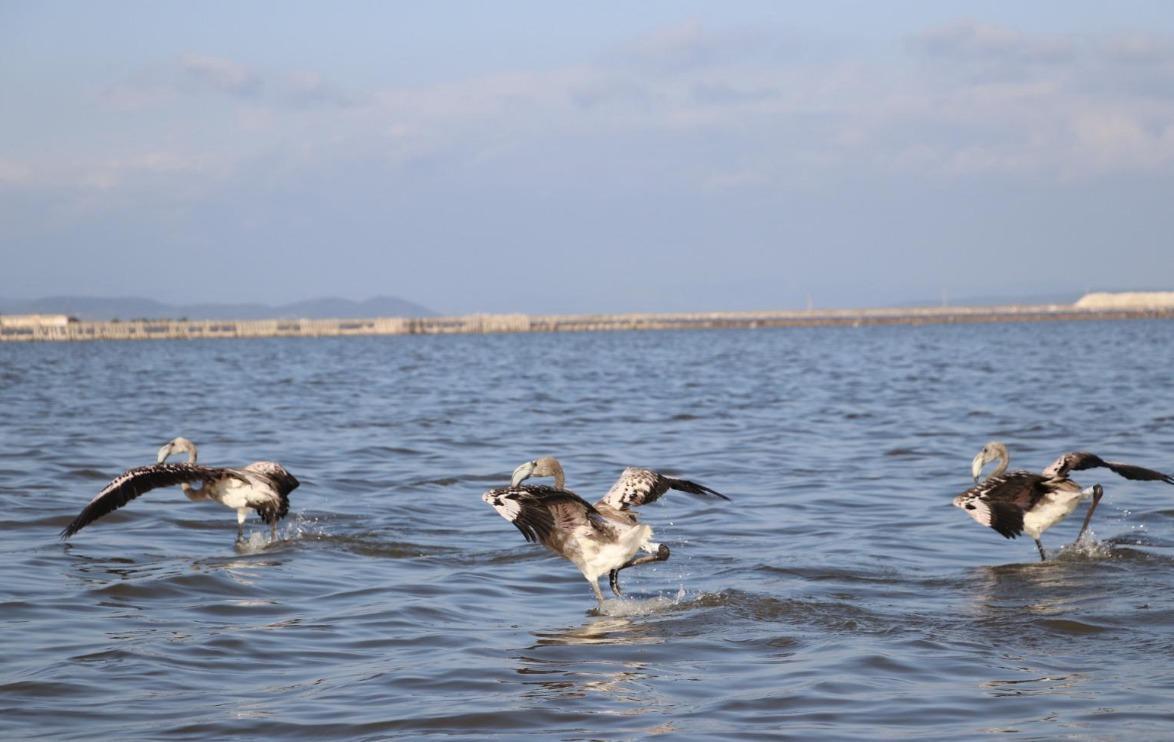
The flight route, life span and cycles of 262 baby flamingos, expected to fly at the end of this month in İzmir Bird Sanctuary in the Gediz Delta, will be monitored with the rings attached to their feet.
Conservation projects will be developed for flamingos with the data to be obtained.
This year, 14,068 pairs of flamingos used the artificial flamingo breeding island in the İzmir Bird Sanctuary in the Gediz Delta, which is one of the two breeding spots for flamingos along with Tuz Gölü.
In cooperation with the General Directorate of Nature Conservation and National Parks, Ege University, Ankara University and the United Nations Food and Agriculture Organization (FAO), work was carried out to ring the offspring in the artificial flamingo breeding island of Izmir Bird Paradise.
Some 14,000 baby flamingos were identified in the water by a team of 90 people, including volunteers. Most of the flamingos could not be reached because they started to fly, but 262 of them were traced, and a plastic ring was attached to their right leg and a metal ring on their left leg. Thanks to the Türkiye-tagged rings, the migration areas and life cycles of baby flamingos will be examined and conservation projects will be prepared according to the data obtained.
Arzu Gürsoy Ergen, a faculty member at the Ankara University's Department of Biology who participated in the study, stated that in the whole world, 25 percent of flamingos were born in Asia, Europe and West Africa, and 10 percent were born in Türkiye.
Stating that biologists, veterinarians, engineers, physicians and volunteers between the ages of 9-65 attached rings on the legs of baby flamingos, Ergen said, “A flamingo ringed in Türiye is also known from this ring when it goes to France. There is already an international network, and through this network, for example, it was seen in Spain, it was seen in Italy. Türkiye is immediately notified via the network. This is a population-oriented study. In other words, how long the Turkish-born flamingos live in Türkiye, where they are and how long they roam, etc., are important to make a conservation program. As part of this work, we also took parasite samples and feather samples to conduct genetic studies, and with the data to be obtained as a result of these studies, we will contribute to their protection. This is our main goal.”
Ergen said that the studies in 2019 revealed that a ringed flamingo went to Ukraine, a place where it should not have gone at all.
“In fact, we learned through this ringing study that climate change also affected these species and started to spread in areas where they did not exist. Therefore, we will obtain the effects of the changes on the species by collecting the results of these studies for many years. Conservation studies carried out at the international level must be completely based on scientific data, and while this data is being obtained, plans are made for conservation works on the basis of the results of such studies,” Ergen said.
FAO project coordinator Emre Akyüz stated that flamingos are one of the most striking bird species in the Gediz Delta, and said, “They also have an important place in fisheries and their existence is very important for Türkiye and the whole world. That's why we will have some activities to protect flamingos and improve their population. One of these activities is the ringing activity supported by FAO. In this way, the life cycles of flamingos will be examined. Where they migrated will be examined. As FAO, we are aware of the importance of biodiversity and we support it. In this sense, work within the scope of this project will continue. Rehabilitation of the artificial flamingo island in the Gediz Delta can be mentioned among these studies.”